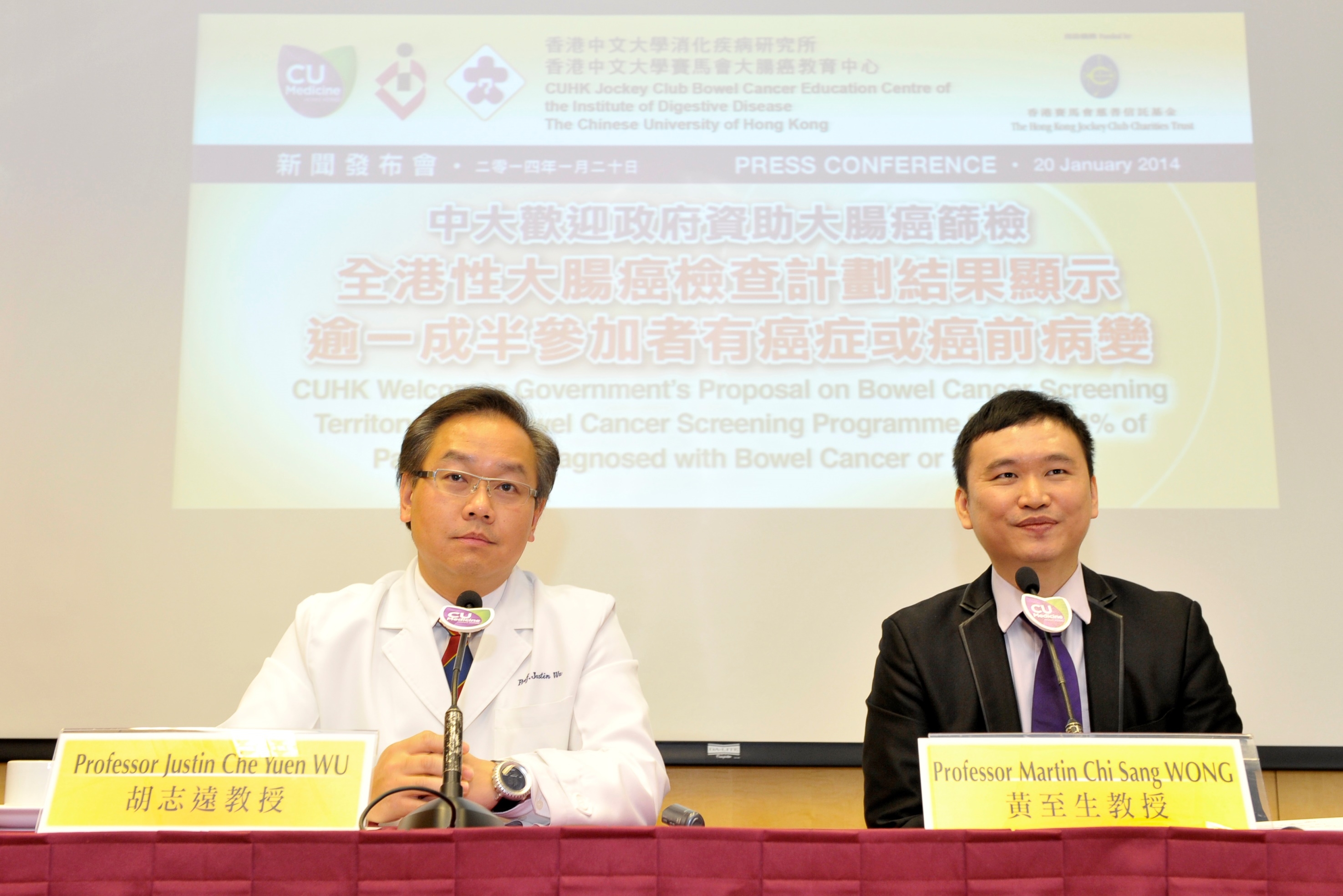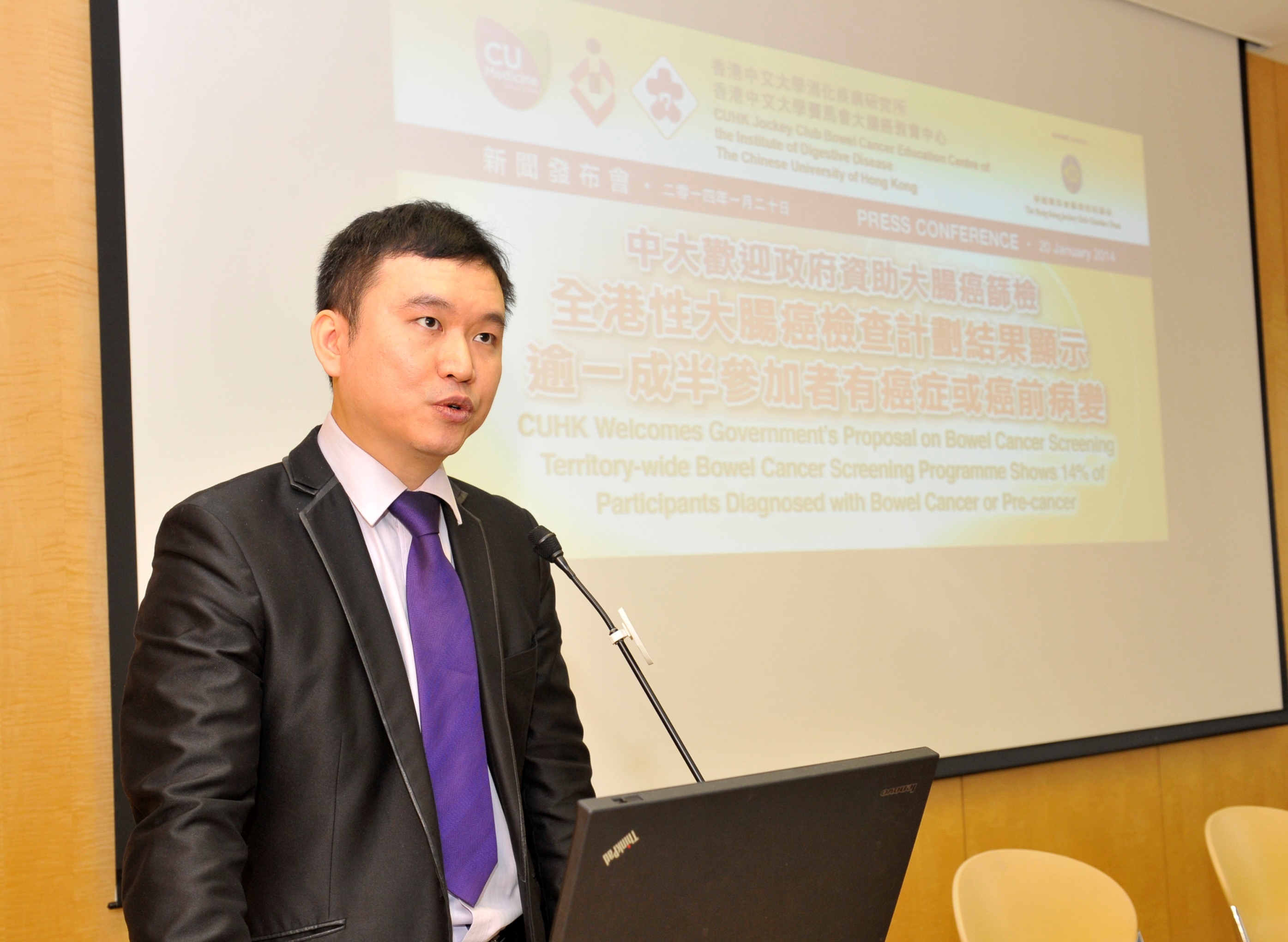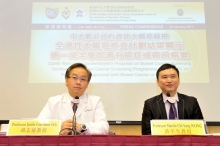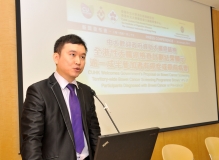CUHK
News Centre
CUHK Welcomes Government’s Proposal on Bowel Cancer ScreeningTerritory-wide Bowel Cancer Screening Programme Shows 14% of Participants Diagnosed with Bowel Cancer or Pre-cancer
In recent years, bowel cancer has become the most common cancer and the second leading cancer killer inHong Kong, with 4,450 new cases and causing more than 1,900 deaths per year. In the 2014 Policy Address, the Chief Executive proposed subsidising bowel cancer screening for higher risk groups and the Department of Health will start the preparatory work of a pilot programme this year. The Chinese University of Hong Kong (CUHK) welcomes the launch of the pilot programme, which is visionary to the emerging health threats of bowel cancer to Hong Kong people. According to international documentation, early detection of bowel cancer through screening (faecal occult blood test or colonoscopy) can greatly reduce mortality rate by 33 to 68%. In the long run, it helps reduce death rate and resource burden on bowel cancer treatment.
The CUHK Faculty of Medicine has pioneered the work on the health hazard and prevention of bowel cancer since 2004. The Faculty has established the largest bowel cancer screening database in Hong Kong and led 14 Asia-Pacific countries to study the trend of bowel cancer in Asia. It has also been sharing experience with the government on the best strategy of implementing bowel cancer screening in Hong Kong.
Prof. Justin Che Yuen Wu, Professor of Institute of Digestive Disease, Faculty of Medicine, CUHK said, ‘We understand this policy will have implications on the workload of public health care system, especially the demand for endoscopy service, which is currently suffering from long waiting time. Although the international guidelines recommend much broader coverage on the age for screening, this pilot programme strikes a prudent balance between societal needs and capacity of our health care system.’
To raise public awareness of bowel cancer and to promote early screening, the CUHK Jockey Club Bowel Cancer Education Centre (Centre) launched a territory-wide bowel cancer screening programme in May 2008. As of December 2012, the Centre had conducted bowel cancer screenings for 10,732 eligible participants aged 50 to 70, without any symptoms of bowel cancer, who were also physically fit for the tests. 5,863 (55%) participants received faecal occult blood tests and 4,869 (45%) underwent colonoscopy. The programme successfully identified precancerous polyps or bowel cancer in 1,512 (14%) participants.
Prof. Martin Chi Sang Wong, Director, CUHK Jockey Club Bowel Cancer Education Centre, remarked, ‘The findings show that bowel cancer screening is an effective, safe, technically feasible and highly accepted procedure for the public. The Centre will continue its effort to provide more bowel cancer-related findings for the benefits of our society.’
CUHK is now working on several initiatives to provide possible solutions for society on prevention of bowel cancer and promotion of bowel screening, including priority targeted screening for high-risk people, sustainable financing model of screening and intervention, and enhancing the role of primary care doctors, especially family physicians, in bowel cancer screening.
CUHK Jockey Club Bowel Cancer Education Centre is now recruiting additional 5,000 participants aged between 40 and 70 for bowel cancer screening from today to 16 February 2014. Interested Hong Kong citizens can register online (http://www.idd.med.cuhk.edu.hk/bowelcancer/screening2014) or via a 24-hour automated telephone system (tel: 3151-5666).
About CUHK Jockey Club Bowel Cancer Education Centre
In May 2008, The Institute of Digestive Disease at CUHK was generously funded with 16 million by The Hong Kong Jockey Club Charities Trust to set up the CUHK Jockey Club Bowel Cancer Education Centre and launched the project ‘Bowel Cancer in Hong Kong: Education, Promotion and Screening’. In 2013, another 16 million were donated to launch another phase of 5-year bowel cancer education and screening programme. The Centre provides health education and support for people who are at risk of bowel cancer, and reaches out to the community through its events and partnerships with other health organizations. The Centre hopes to get the message across that early detection and prevention of bowel cancer can save lives.
Prof. Justin Wu (left), Professor of Institute of Digestive Disease, Faculty of Medicine, CUHK, and Prof. Martin Wong, Director, CUHK Jockey Club Bowel Cancer Education Centre share the findings of the territory-wide bowel cancer screening programme.





